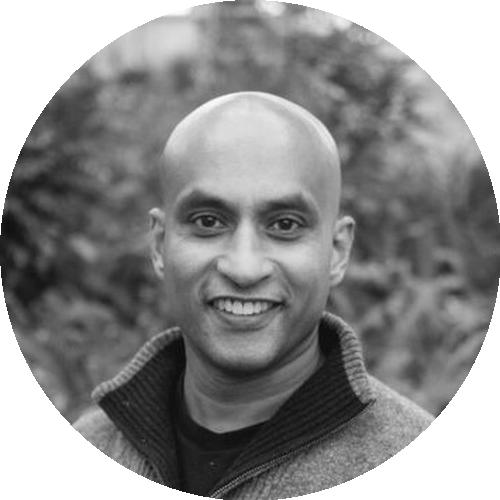Researchers and entrepreneurs take their first steps toward the marketplace through CoMotion’s signature innovation training program

How can artificial intelligence help calculate carbon emissions and recommend reductions using clean energy? As part of postdoctoral work in deep-learning architectures with UW’s Digital Arts & Experimental Media program (DXARTS), Forrest Fabian Jesse has been exploring this question.
“Our team developed an AI model that uses solar power to understand the constituent makeup of objects and processes, say, the production chain of a water bottle, and estimates how much carbon they sequester,” Jesse says, noting that this carbon accounting model—the “uncircularity” model—could be useful in the broader effort to reduce emissions and prevent global warming.
Then the uncircularity team hit upon an all-too-common question in academic research: “Where do you go? What does society need? Maybe you created something that’s useful somewhere, somehow, but you don’t know how it fits,” Jesse says.
That’s where CoMotion comes in with the National Science Foundation’s Innovation Corps (I-Corps) program. UW I-Corps is a five-week workshop designed to support researchers and entrepreneurs at the earliest stages of commercialization, the process of translating ideas from the lab to the marketplace. We spoke to Jesse and other members of the fall 2024 I-Corps cohort who are navigating this journey.

Forrest Fabian Jesse
Lesson 1: Everything begins and ends with the customer

Soraya Bailey
The I-Corps curriculum pairs expert coaching and mentorship with rigorous exercises in pitching, market research, and customer discovery, or the process of cold-calling potential customers to identify where the technology might do the most good. Teams complete a certain number of interviews per week and present their findings at the end of the course.
“It’s sort of counterintuitive to us as scientists and engineers; we want to solve problems, we don’t really want to go talk to people about them,” says Soraya Bailey, director of innovation training at CoMotion and part of the I-Corps teaching team. “But the goal is to talk to people experiencing these problems. What do they need? How much are they willing to pay for a solution? And can your technology offer a solution?”
The interview process was particularly eye-opening for Peter Chien, who is preparing to defend his PhD in bioengineering at UW. He took the I-Corps workshop on behalf of UW spinoff Truly Technologies, which had developed a way to passively concentrate liquid biospecimens to enable at-home diagnostic testing but didn’t have a clear idea of which diseases it could best help identify. Or, as Chien says, “We were a hammer looking for the right nail.”
Interviews with doctors and patients in different disease areas helped Chien identify routine monitoring of recurrent cancers as a potential application of the technology, and develop empathy for people administering and receiving diagnoses. Bladder cancer, for example, recurs in 80% of patients within two years, and early detection, at every stage, is key to survival. Right now, the gold standard for this testing is cystoscopy, an invasive procedure performed at three-month intervals.
“So we narrowed our customer segment down from all these disease areas to bladder cancer, where we have urologists who want to minimize pain and anxiety for patients undergoing monitoring, and cancer patients who experience pain with cystoscopy and are maybe skipping routine monitoring,” Chien says. “It felt good to find an application where we can maybe make a difference, and it gives us hope that the technology has applications in other areas as well.”

Peter Chien
Lesson 2: Tell your story in 60 seconds or less
In addition to weekly half-day seminars with breakout-room exercises, the homework of customer interviews, and mentor office hours, the program provides regular opportunities for pitch practice and feedback, culminating in a one-minute pitch at the end of the course.
“We want you to be comfortable synthesizing your ideas and sharing them with a wide audience, outside your area of study,” Bailey tells participants. “It’s really hard to present on a big topic but, as you go forward in your entrepreneurship, you need to speak about your work in a concise, accessible way.”

Infant Raj
This can be a challenge for researchers or entrepreneurs who are immersed in the technical details and implications of their project.
“Part of what I was looking for in I-Corps is how to communicate from the academic side to the business side, because how you’re going to pitch to them is totally different than presenting at an academic conference,” says Infant Raj, VP of development on the uncircularity team, who conducted many of its interviews. “Don’t think of it like a researcher going to a workshop. I-Corps isn’t a workshop; it’s an immersive exercise in thinking and communicating like a businessperson.”
Jesse and Raj say the feedback on their final presentation will stay with them as they pursue patents and seed funding in the year ahead.
Lesson 3: Don’t go it alone
When Diana Tan cofounded Brief, a platform that uses AI to help clients understand and manage contracts, and enrolled in I-Corps, she wasn’t entirely sure what to expect.
“Timing-wise, we were at an inflection point in our business where we knew we couldn’t move forward alone,” Tan says. “I had thought that I-Corps would be more of a classroom exercise with presentations. Instead it was people coming into our breakout room every week, holding us accountable and asking us hard questions about our business.”
Brief is also a member of the CoMotion Labs tech+ incubator at Startup Hall. As a graduate of UW’s Human-Centered Design & Engineering master’s program, Tan knows the benefit of proximity and synergy with fellow UW-affiliated startups and access to the resources of a world-class research institution.
“A huge part of building a network is repeated interactions with people,” she says. “When we’re all in the same place, we can build long-term relationships.” In the coming months, Brief will launch its minimum viable product with its enterprise partners and prepare for the next stage of fundraising.

Diana Tan

Dhileep Sivam
Some of the most important relationships that come out of the I-Corps program are between participants and CoMotion’s community of mentors, who also provide one-on-one coaching throughout the course.
“The uncircularity team is tackling an enormous problem,” says uncircularity’s assigned mentor Dhileep Sivam, a veteran clean-tech entrepreneur and newly installed CEO of UW spinoff Aquagga. “One of the benefits of I-Corps was encouraging them to narrow down and focus on a more achievable scope. It was great to see them make that shift.” Sivam is still in touch with Jesse and Raj.
“My experience of research is that a lot of it’s on your own and you’re in the dark, searching around with your little flashlight, trying to find some glimmer of what’s useful,” Jesse says of coming into a mentoring relationship. “Then suddenly, there’s somebody standing next to you holding like, five spotlights pointing the way. That mentorship is directional, and it’s inspiring.”
This fall, UW was one of eight universities to receive an NSF I-Corps Hub grant, which created a Northwest Regional Hub and provides $15M, spread across the institutions over five years, to bolster their I-Corps programs. CoMotion is committed to growing and strengthening its I-Corps program to support the next generation of academic entrepreneurs. Learn more about UW’s I-Corps program and how to apply.